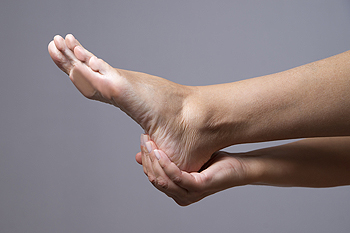 Plantar fasciitis occurs when the plantar fascia in your foot becomes inflamed. The plantar fascia is a long ligament that runs along the bottom of your foot, providing it with structural support. Plantar fasciitis pain is usually felt early in the morning and tends to go away as the day goes on. Common treatment methods for the condition are rest, ice, and arch supports. In some cases, none of these at-home treatments may be effective, so it is important that you see a podiatrist if this is the case for you.
Plantar fasciitis occurs when the plantar fascia in your foot becomes inflamed. The plantar fascia is a long ligament that runs along the bottom of your foot, providing it with structural support. Plantar fasciitis pain is usually felt early in the morning and tends to go away as the day goes on. Common treatment methods for the condition are rest, ice, and arch supports. In some cases, none of these at-home treatments may be effective, so it is important that you see a podiatrist if this is the case for you.
Plantar fasciitis can be very painful and inconvenient. If you are experiencing heel pain or symptoms of plantar fasciitis, contact Dr. Dushack from APEX Foot & Ankle Center. Our doctor can provide the care you need to keep you pain-free and on your feet.
What Is Plantar Fasciitis?
Plantar fasciitis is the inflammation of the thick band of tissue that runs along the bottom of your foot, known as the plantar fascia, and causes mild to severe heel pain.
What Causes Plantar Fasciitis?
- Excessive running
- Non-supportive shoes
- Overpronation
- Repeated stretching and tearing of the plantar fascia
How Can It Be Treated?
- Conservative measures – anti-inflammatories, ice packs, stretching exercises, physical therapy, orthotic devices
- Shockwave therapy – sound waves are sent to the affected area to facilitate healing and are usually used for chronic cases of plantar fasciitis
- Surgery – usually only used as a last resort when all else fails. The plantar fascia can be surgically detached from the heel
While very treatable, plantar fasciitis is definitely not something that should be ignored. Especially in severe cases, speaking to your doctor right away is highly recommended to avoid complications and severe heel pain. Your podiatrist can work with you to provide the appropriate treatment options tailored to your condition.
If you have any questions please feel free to contact our offices located in Fort Myers and Naples, FL . We offer the newest diagnostic and treatment technologies for all your foot and ankle needs.
Read more about Plantar Fasciitis